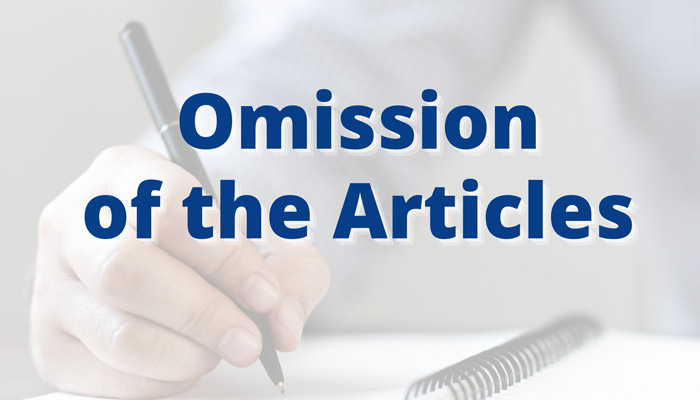The most popular topic in Portuguese grammar is when it is necessary to use articles. It is logical that the second most popular topic is when it is definitely not necessary to put articles. In fact, there are many different situations. But you don’t have to fill your head with it. In ordinary life, we need only a few rules. The rest of the rules will be discussed in the context of other topics.
Appeal
We know that we put definite articles before names. But there is one important case when the article is prohibited: when addressing!
- Estás bem, João? (Are you okay, Joao?)
- Até à próxima, Maria! (See you next time Maria!)
Similarly, the rule works for any address, even when we use a possessive pronoun. Do you remember that in other cases, possessive pronouns require a definite article?
- Boa noite, minha querida! (Good night my dear!)
- Boa viagem, meu amigo! (Have a nice trip my friend!)
Demonstrative pronoun
It may seem obvious to you, but we do not put the article before demonstrative pronouns: este/esta, esse/essa, aquele/aquela. Knowing this, we can avoid situations where we doubt whether the article is needed and whether it is definite or indefinite. That is, we put the possessive pronoun and forget about the articles.
Namely, instead of “Eu uso um/o carro” (I use a car.) we can say “Eu uso este carro”. How do you like the life hack? Not always, of course, this way you can get out of the situation, but you need to remember this.
If in the text we see the letter “a” before the demonstrative pronoun, then this is not an article, but a preposition of the direction “a”.
Numerals
We put articles before names, nouns, possessive pronouns, so often students are drawn to put the article before the numeral too, but this is a mistake! Remember, no article is needed before the numerals!
- Eu tenho três gatos. (I have three cats.)
- Nós usamos dois carros. (We use two machines.)
Do not confuse cardinal numbers with ordinal numbers. Ordinal numbers necessarily require the definite article: o primeiro lugar (the first place), a segunda parte (the second part), o décimo andar (the tenth floor).
Month
Of all units of time, only the name of the month is not preceded by an article. All the rest – hour, day, week, year and season – have an article.
- Estou em Portugal em janeiro. (I am in Portugal in January.)
- Ele faz anos em abril. (His birthday is in April.)
There is only one exception. When a sentence has a definition that refers to a month, for example:
- É um setembro perfeito. (It’s the perfect September.)
In this case, the month is distinguished from a series of identical months, that is, you can say “one of” instead of the indefinite article.
Cities, planets, stars
In general, there is no need to put an article before the names of cities. There are a few exceptions like o Porto, o Rio de Janeiro, a Guarda and so on, but there are so few of them that it is better to remember the main rule – cities without articles.
- Estou em Londres. (I’m in London.)
There is one more exception – the situation when there is a definition in the phrase, that is, the city is highlighted. For example:
- É o Paris da minha juventude. (This is the Paris of my youth.)
That is, not the Paris that is for everyone, but the one that I remember, exclusive, specific, certain. In general, this exception can work for any concept.
But for planets and stars there are no exceptions and the article is not put in front of them. If the topic of stars is useful only to astronomers, then the planets are discussed in any company: Marte, Sirius, Jupiter, and so on.
Enumeration
If we want to voice a list of items, there is no need to put an article before each of them. For example:
Na minha mochila estão: telemóvel, chave, dinheiro, lápis e caderno. (In my backpack there are: a phone, a key, money, a pencil and a notebook.)
Despite the fact that each item is specific, it does not matter when listing items.
Subject
In order to describe what disciplines we study at school or university, we usually need the following verbs: aprender (to study), estudar (to study), ensinar (to teach). When these verbs are followed by the name of the subject/discipline, the preposition is not put:
Eu aprendo _ português. (I am learning Portuguese.)
Na escola ensinam _ astronomia. (Astronomy is taught at school.)
Lessons
In the case of sports activities, musical instruments and other activities, after the verbs denoting “play” – jogar and tocar, we do not put the article. The verb “jogar” here refers to sports, while “tocar” refers to musical instruments.
Ele joga _ futebol. (He plays football.)
Ela toca _ piano. (She plays piano.)
Similar story with board games:
Nós jogamos _ xadrez. (We are playing chess.)
In the case of sports, music and games, we use a general concept that characterizes a person’s skill or passion, so there is no need to specify with the help of the definite article.
Não ter (Not to have)
We are used to using articles after the expression with the verb “ter” (to have). That is: Eu tenho um livro muito interessante. (I have a very interesting book.) However, as soon as the negative particle “não” is added, the article disappears:
Não tenho _ carro. (I do not have a car.)
Qual é o pássaro que não tem _ assas?(What bird does not have wings?)
This is explained by the fact that when we have something, we can not specify it (put the indefinite article), but we can, on the contrary, specify it (put the definite article). When we do not have something, then this object simply does not exist, we cannot say anything about it, therefore we simply do not put the article.
Conclusion
Do not worry that not absolutely all the rules we have considered. Information overload would be less useful. With what you learned in this article, you can communicate competently on almost any topic. Moreover, you must admit that without a pretext they will still understand us, since it does not carry any semantic load.
Even in fluent speech, speakers often “swallow” sounds, so articles may well be lost. However, to avoid situations when you need to choose whether to put an article or not, you will definitely meet in written communication.

